
Jane Eyre is a novel by the English writer Charlotte Brontë. It was published under her pen name "Currer Bell" on 19 October 1847 by Smith, Elder & Co. of London. The first American edition was published the following year by Harper & Brothers of New York. Jane Eyre is a bildungsroman that follows the experiences of its eponymous heroine, including her growth to adulthood and her love for Mr Rochester, the brooding master of Thornfield Hall.

Slaughterhouse-Five, or, The Children's Crusade: A Duty-Dance with Death is a 1969 semi-autobiographic science fiction-infused anti-war novel by Kurt Vonnegut. It follows the life experiences of Billy Pilgrim, from his early years, to his time as an American soldier and chaplain's assistant during World War II, to the post-war years. Throughout the novel, Billy frequently travels back and forth through time. The protagonist deals with a temporal crisis as a result of his post-war psychological trauma. The text centers on Billy's capture by the German Army and his survival of the Allied firebombing of Dresden as a prisoner of war, an experience that Vonnegut endured as an American serviceman. The work has been called an example of "unmatched moral clarity" and "one of the most enduring anti-war novels of all time".
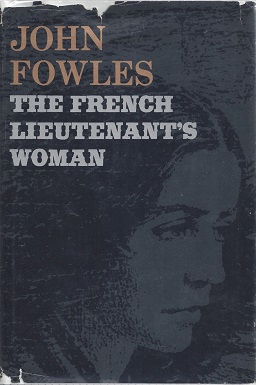
The French Lieutenant's Woman is a 1969 postmodern historical fiction novel by John Fowles. The plot explores the fraught relationship of gentleman and amateur naturalist Charles Smithson and Sarah Woodruff, the former governess and independent woman with whom he falls in love. The novel builds on Fowles' authority in Victorian literature, both following and critiquing many of the conventions of period novels.

Bluebeard, the Autobiography of Rabo Karabekian (1916–1988) is a 1987 novel by American author Kurt Vonnegut. It is told as a first-person narrative and describes the late years of fictional Abstract Expressionist painter Rabo Karabekian, who first appeared as a minor character in Vonnegut's Breakfast of Champions (1973). Circumstances of the novel bear rough resemblance to the fairy tale of Bluebeard popularized by Charles Perrault. Karabekian mentions this relationship once in the novel.
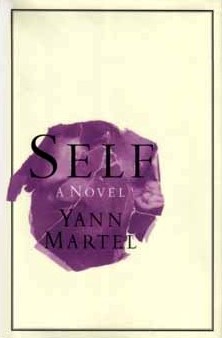
Self is a novel by Yann Martel. It tells the story of a traveling writer who wakes up one morning to discover that he has become a woman. It was first published by Knopf Canada in 1996.

Time's Arrow: or The Nature of the Offence (1991) is a novel by Martin Amis. It was shortlisted for the Booker Prize in 1991. It is notable partly because the events occur in a reverse chronology, with time passing in reverse and the main character becoming younger and younger during the novel.

A Wild Sheep Chase is the third novel by Japanese author Haruki Murakami. First published in Japan in 1982, it was translated into English in 1989. It is an independent sequel to Pinball, 1973, and the third book in the so-called "Trilogy of the Rat". It won the 1982 Noma Literary Newcomer's Prize.
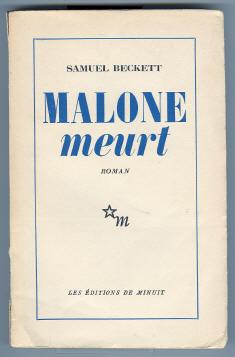
Malone Dies is a novel by Samuel Beckett. It was first published in 1951, in French, as Malone meurt, and later translated into English by the author.

An Artist of the Floating World (1986) is a novel by British author Kazuo Ishiguro. It is set in post-World War II Japan and is narrated by Masuji Ono, an ageing painter, who looks back on his life and how he has lived it. He notices how his once-great reputation has faltered since the war and how attitudes towards him and his paintings have changed. The chief conflict deals with Ono's need to accept responsibility for his past actions, rendered politically suspect in the context of post-War Japan. The novel ends with the narrator expressing good will for the young white-collar workers on the streets at lunchbreak. The novel also deals with the role of people in a rapidly changing political environment and with the assumption and denial of guilt.

Stranger than Fiction is a 2006 American fantasy comedy drama film directed by Marc Forster, produced by Lindsay Doran and written by Zach Helm. The film stars Will Ferrell, Maggie Gyllenhaal, Dustin Hoffman, Queen Latifah and Emma Thompson. The main plot follows Harold Crick (Ferrell), an IRS agent who begins hearing a disembodied voice narrating his life as it happens – seemingly the text of a novel in which it is stated that he, the main character, will soon die – and he frantically seeks to somehow prevent his death.

The Brief Wondrous Life of Oscar Wao is a 2007 novel written by Dominican American author Junot Díaz. Although a work of fiction, the novel is set in New Jersey in the United States, where Díaz was raised, and it deals with the Dominican Republic's experience under dictator Rafael Trujillo. The book chronicles the life of Oscar de León, an overweight Dominican boy growing up in Paterson, New Jersey, who is obsessed with science fiction and fantasy novels and with falling in love, as well as a curse that has plagued his family for generations.
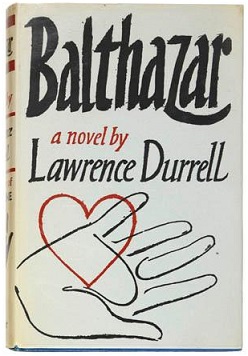
Balthazar, published in 1958, is the second volume in The Alexandria Quartet series by British author Lawrence Durrell. Set in Alexandria, Egypt, around World War II, the four novels tell essentially the same story from different points of view and come to a conclusion in Clea. Balthazar is the first novel in the series that presents a competing narrator, Balthazar, who writes back to the narrating Darley in his "great interlinear".

Leviathan is American writer Paul Auster’s seventh novel, published by Viking Press in 1992. The novel follows the life and crimes of a man who decides to take action over words to deliver his message to the world, as told by his estranged best friend.
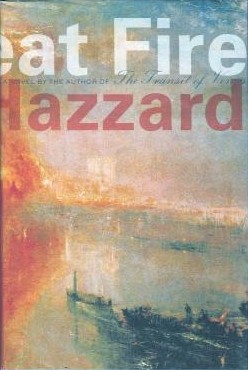
The Great Fire (2003) is a novel by the Australian author Shirley Hazzard. It won the U.S. National Book Award for Fiction and a Miles Franklin literary award (2004). The novel was Hazzard's first since The Transit of Venus, published in 1980.

Lolita is a 1955 novel written by Russian-American novelist Vladimir Nabokov that addresses the controversial subject of hebephilia. The protagonist is a French literature professor who moves to New England and writes under the pseudonym Humbert Humbert. He describes his obsession with a 12-year-old "nymphet", Dolores Haze, whom he kidnaps and sexually abuses after becoming her stepfather. Privately, he calls her "Lolita", the Spanish nickname for Dolores. The novel was originally written in English, but fear of censorship in the U.S. and Britain led to it being first published in Paris, France, in 1955 by Olympia Press.

Mating (1991) is a novel by American author Norman Rush. It is a first-person narrative by an unnamed American anthropology graduate student in Botswana around 1980. It focuses on her relationship with Nelson Denoon, a controversial American social scientist who has founded an experimental matriarchal village in the Kalahari desert.

The Storyteller is a novel by Peruvian author and Literature Nobel Prize winner Mario Vargas Llosa. The story tells of Saúl Zuratas, a university student who leaves civilization and becomes a "storyteller" for the Machiguenga Native Americans. The novel thematizes the Westernization of indigenous peoples through missions and through anthropological studies, and questions the perceived notion that indigenous cultures are set in stone.
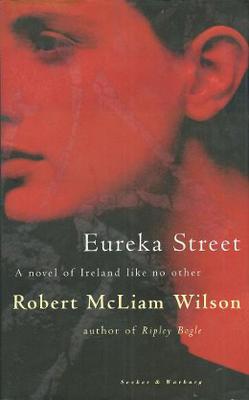
Eureka Street is a novel by Northern Irish author Robert McLiam Wilson, published in 1996 in the UK, it focuses on the lives of two Belfast friends, one Catholic and one Protestant, shortly before and after the IRA ceasefire in 1994. A BBC TV adaptation of Eureka Street was broadcast in 1999.

Dancing Arabs is the 2002 debut novel of Palestinian writer Sayed Kashua of Israel. The work is considered semi-autobiographical, as it draws much on Kashua’s real experiences growing up as an Arab citizen of Israel. He is also a screenwriter and columnist, publishing most of his work in Hebrew.

"The Man Who Studied Yoga", a novella by Norman Mailer written in 1952, was first published in the 1956 collection New Short Novels 2 then later in Mailer's 1959 miscellany Advertisements for Myself (AFM). It is a tale of a "writer manqué", or a writer who fails to write, reflecting some of Mailer's own anxiety in the 1950s as he tries to reinvent himself.



















